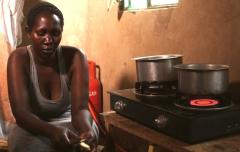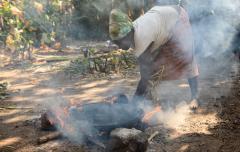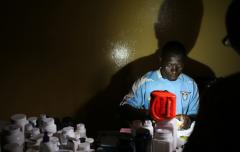Clean Cooking Data for All: using household insights to kickstart clean cooking investment
The World Bank recently estimated that USD 150 billion is required annually to reach universal access to modern cooking services by 2030. It sounds like an astronomical number, but the lack of progress on clean cooking costs the world around USD 2.4 trillion each year due to negative impacts on climate, health, and equality.
A new project funded by the Swedish Postcode Foundation and implemented by Sustainable Energy for All (SEforALL) and Nexleaf Analytics, in collaboration with the Government of Rwanda and key partners including the World Bank’s Energy Sector Management Assistance Program (ESMAP), is looking to enhance policymaking and spark greater investment in clean cooking solutions by giving the sector what every policymaker and investor needs to make sound decisions: accurate, reliable data.
The Clean Cooking Data for All initiative seeks to establish a pathway for household stove usage data to be incorporated into the evidence and information systems for clean cooking investment and decision making. The envisioned data aggregations will give the sector first-of-its-kind evidence by identifying what works for consumers, which will drive decisions for investors, enterprises and governments to allocate resources to the most viable solutions.
Better data means that the next generation of clean cooking products, services, and policies can better serve users, focusing on how they want to cook and how to avoid exposing their own and their families’ lungs to toxic smoke.
Ultimately, the data will help the clean cooking sector better design solutions that will improve user adoption and desired impact, in turn attracting greater investment.
“There are several clean cooking solutions in the market today but very few of them are achieving scale,” said Annette Aharonian, Energy Analyst for Clean Cooking at SEforALL. “Governments, development partners and financiers can hesitate to back specific technologies because they don't have a clear picture of whether targeted end users will sustainably use or be willing to pay for them. The Clean Cooking Data for All initiative aims to give these stakeholders better evidence to inform their resource allocations.”
The first step is to begin collecting and aggregating purchasing and usage data for different cooking solutions. Therefore, beginning in 2022, the Clean Cooking Data for All initiative will begin compiling household data in Rwanda. This 2-year project will utilize available stove-use monitoring technologies among companies installing clean cooking solutions in Rwandan households so usage data can be collected automatically. The resulting data will be combined with household surveys and existing data sets to create a more complete picture of people’s cooking behaviours and preferences.
“We have learned so much by providing continuous, objective, time-series data on exactly how much clean burning stoves are being used, and how much the traditional stoves are being used,” said Nithya Ramanathan, CEO of Nexleaf Analytics. “The Rwanda pilot will generalize this approach, building a data system that can aggregate objective data, in order to determine which cooking solutions have the potential to be scaled.”
The findings from the Rwanda pilot will not only help inform the future development of the clean cooking sector in Rwanda to help the country close current access gaps. They will also determine the feasibility of creating a broader data platform capturing clean cooking data from multiple countries in the coming years.
“The Government of Rwanda has committed to dramatically reducing the number of households relying on firewood and charcoal under its new Biomass Energy Strategy,” said Amb. Claver Gatete, Rwanda's Minister of Infrastructure. “Our Energy Compact on clean cooking also highlights joint actions to achieve these targets. For example, we are proud to be working with Sustainable Energy for All and other partners on the Clean Cooking Data for All initiative, which will provide much-needed evidence to support a national transition to clean cooking.”
The idea for the Clean Cooking Data for All initiative emerged at the 2019 SEforALL Charrettes, where one of the “disruptive solutions” proposed by the clean cooking working group was “an open, dynamic, reliable data platform for next generation clean cooking solutions, identifying what works for consumers.”
Following the Charrettes, SEforALL was intent on supporting the clean cooking sector to make the idea a reality, so we worked with the current project partners to develop the concept and secure funding for the Rwanda pilot data collection. Realizing the platform's contribution to closing energy access gaps and achieving multiple Sustainable Development Goals, the Swedish Postcode Foundation offered its financial support.
“Clean cooking solutions are key to improving the health of millions of people but also crucial when it comes to preventing climate change. The Swedish Postcode Foundation is proud to support SEforALL in their effort to make the shift to clean cooking happen. We trust that the insights from this project will bring us closer to realizing SDG7 and make a real difference,” said Marie Dahllöf, Secretary-General at the Swedish Postcode Foundation.
More information on SEforALL's Clean Cooking programme is available here.



